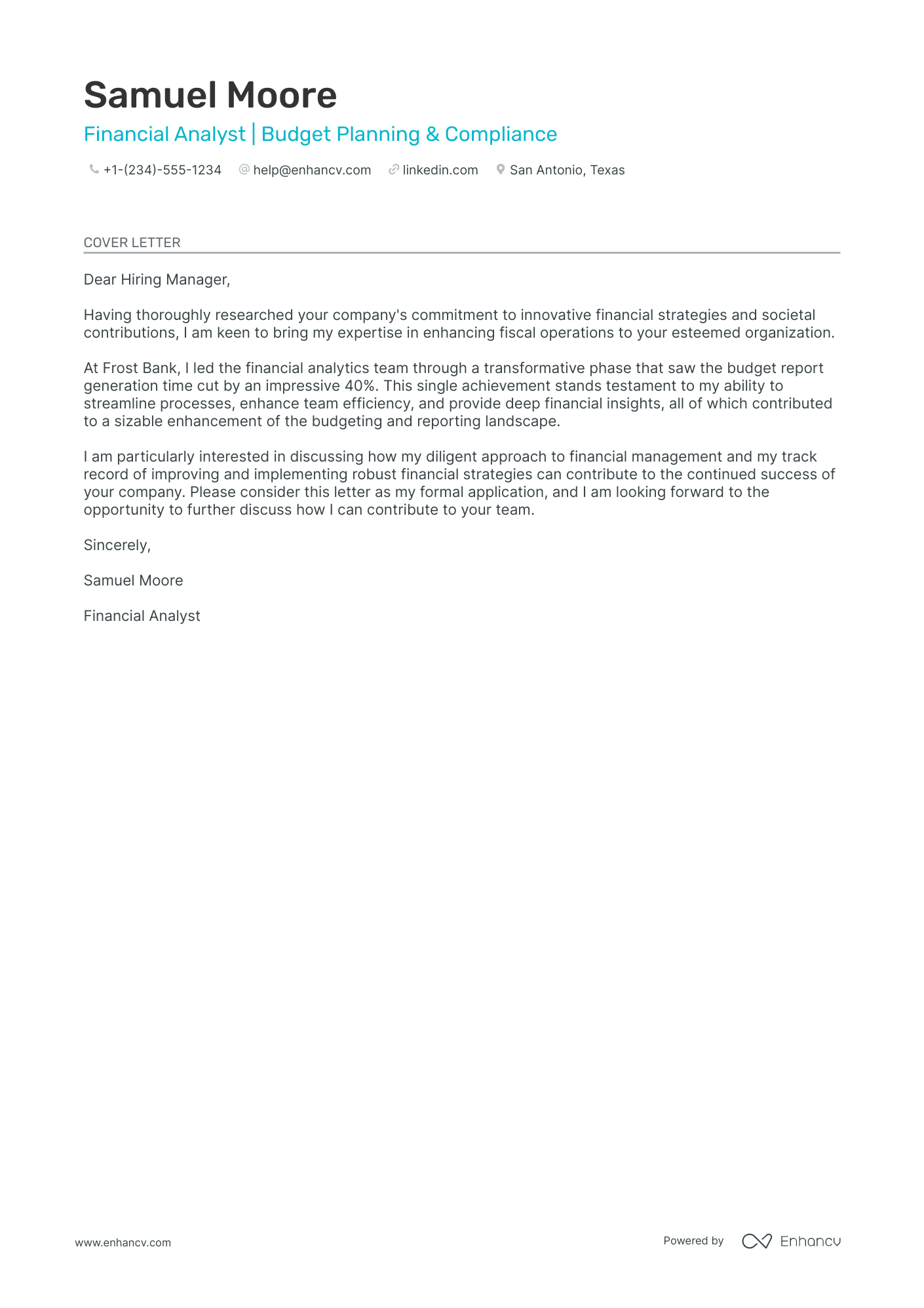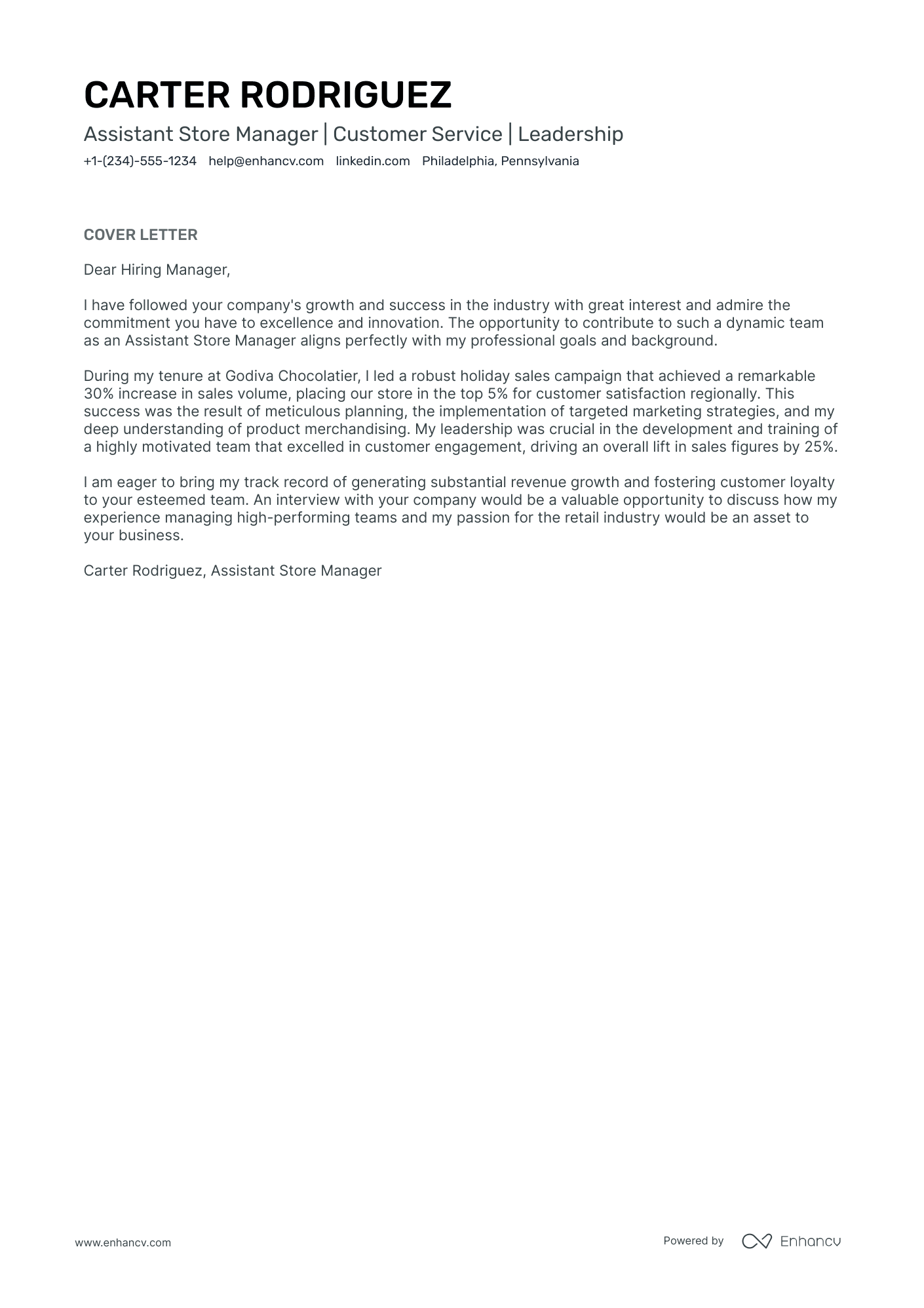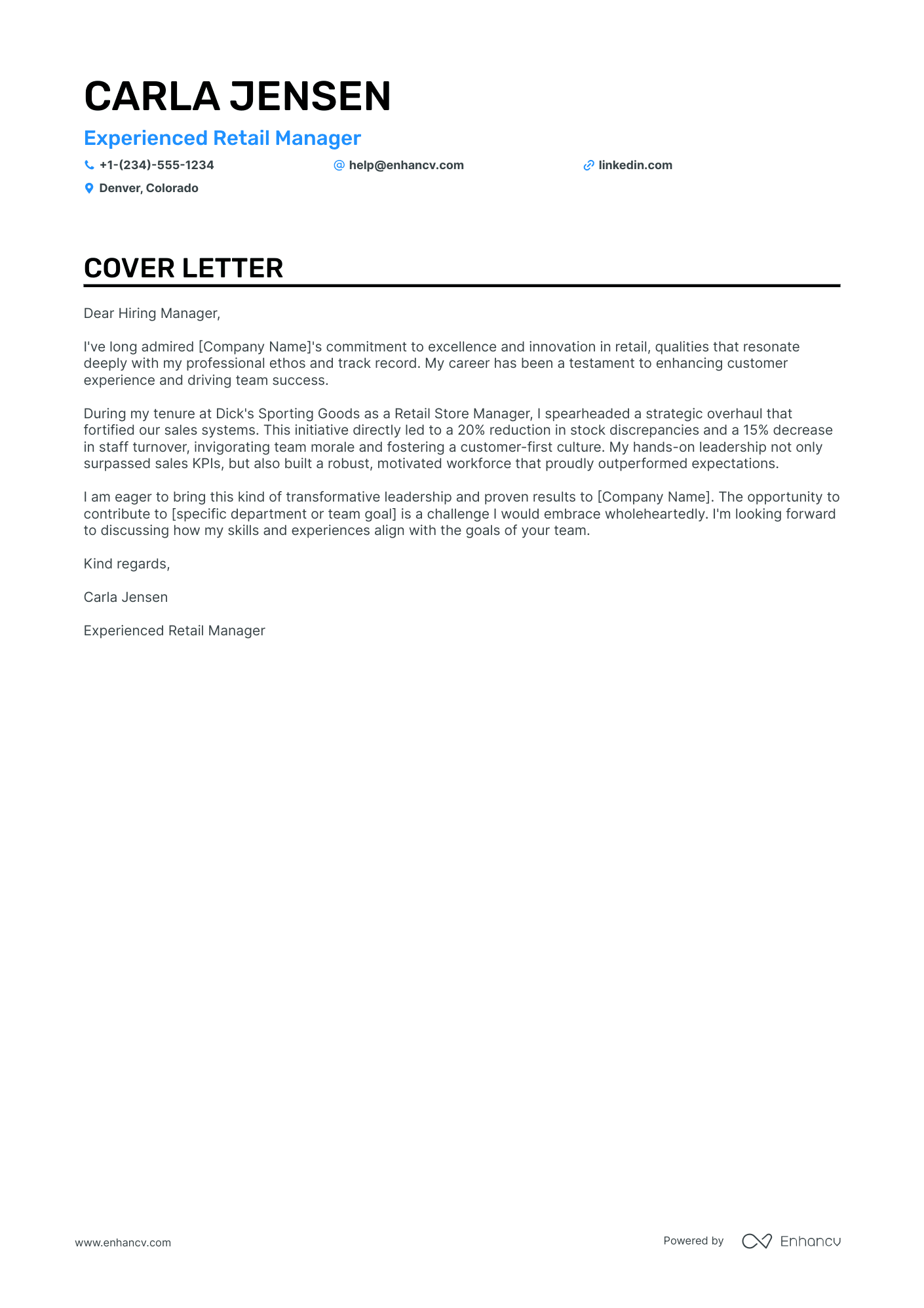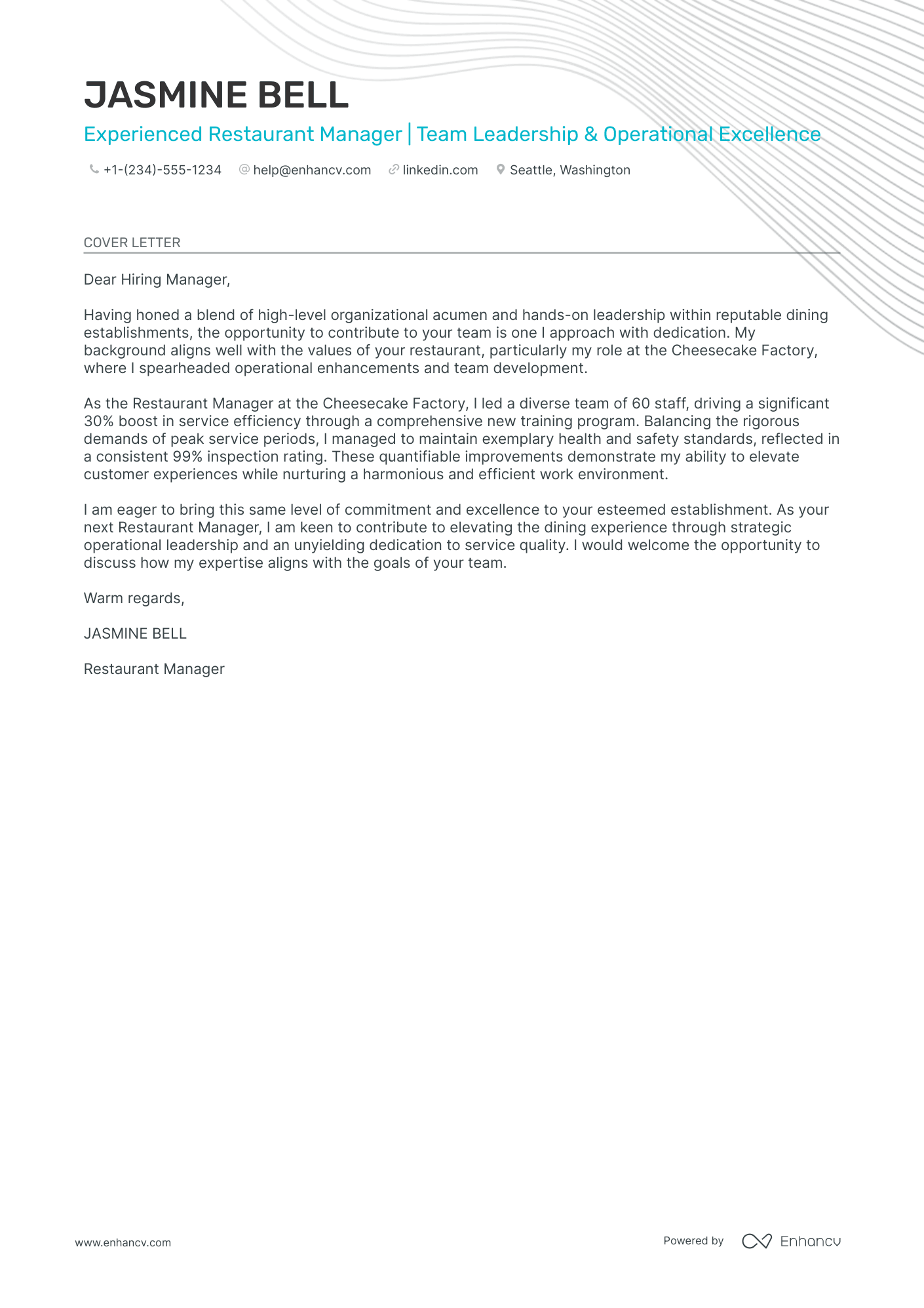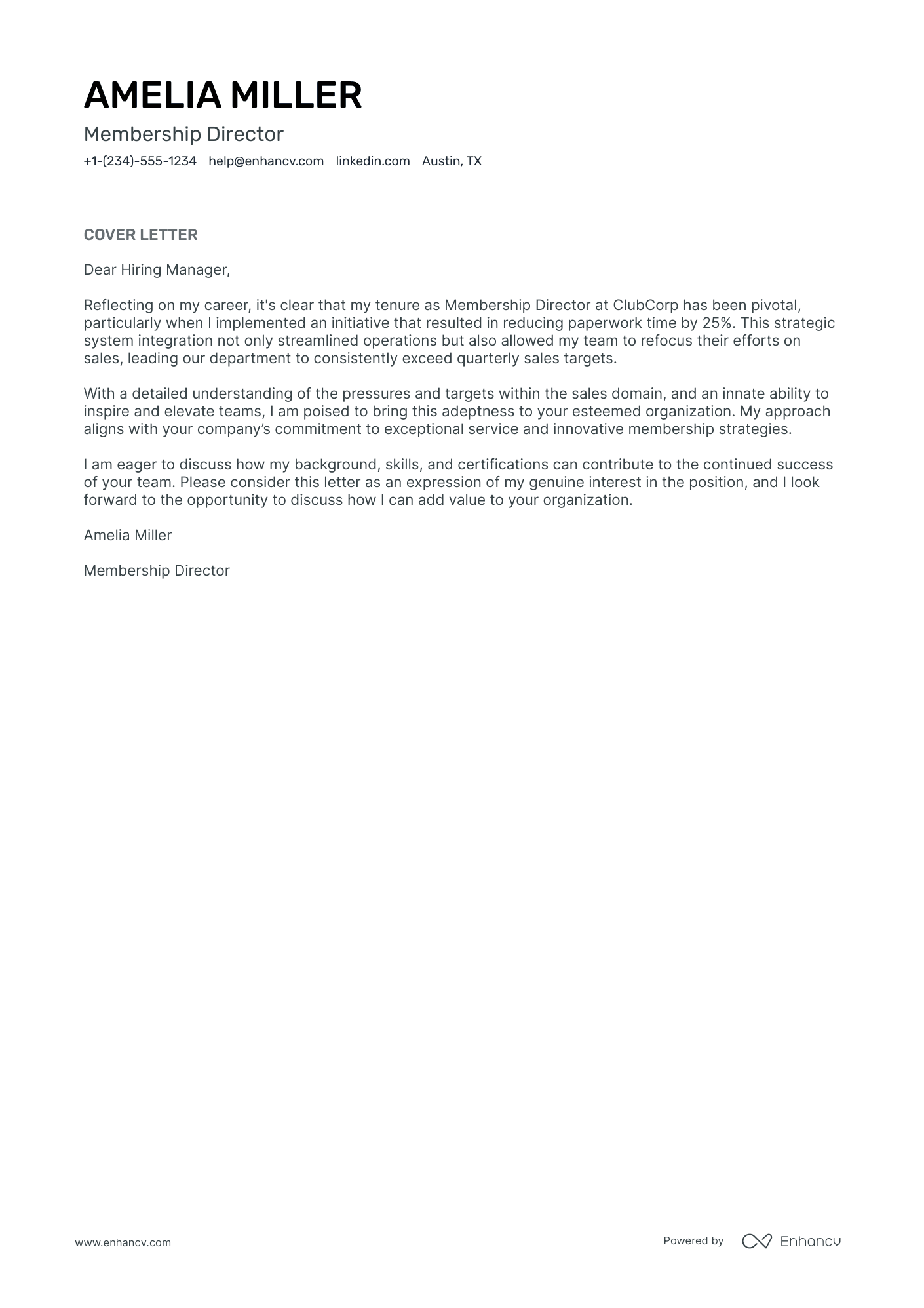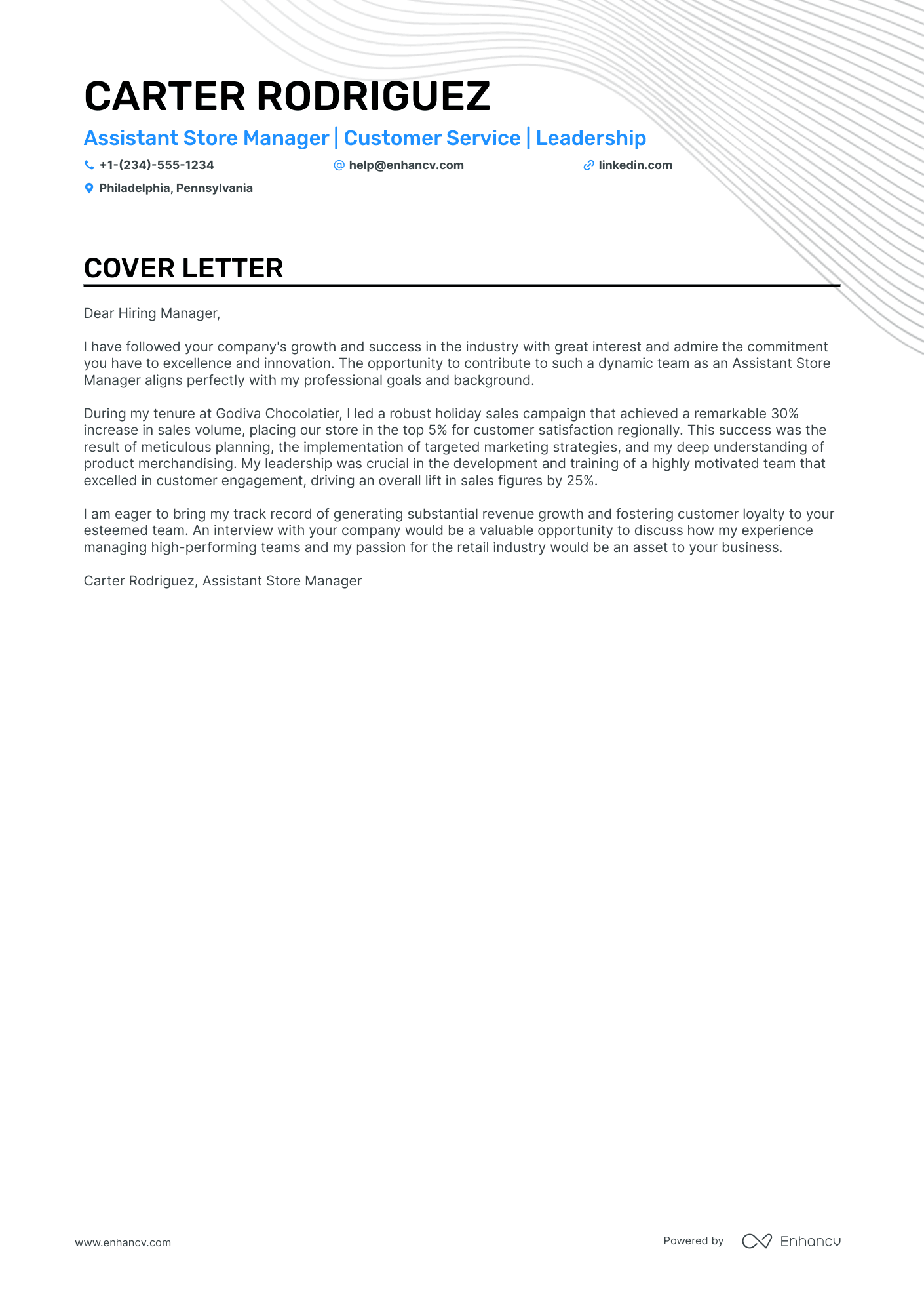Crafting an assistant manager cover letter can feel daunting, especially after you've hit the 'apply' button and realize a blank page awaits your story. Unlike your resume, this is your chance to spotlight your proudest professional moment, to weave a narrative that demonstrates your unique value. Stay formal without falling into the trap of overused phrases, and remember, brevity is key: your compelling tale should fill just one page, leaving hiring managers eager to learn more about you.
- Personalize the greeting to address the recruiter and your introduction that fits the role;
- Follow good examples for individual roles and industries from job-winning cover letters;
- Decide on your most noteworthy achievement to stand out;
- Format, download, and submit your assistant manager cover letter, following the best HR practices.
Use the power of Enhancv's AI: drag and drop your assistant manager resume, which will swiftly be converted into your job-winning cover letter.
If the assistant manager isn't exactly the one you're looking for we have a plethora of cover letter examples for jobs like this one:
Drop your resume here or choose a file.
PDF & DOCX only. Max 2MB file size.
Assistant manager cover letter example
TIMOTHY DUNCAN
Melbourne, VIC
+1-(234)-555-1234
help@enhancv.com
- Quantifiable Achievements: Mentioning specific metrics such as "scaling retail operations by 69%" provides concrete evidence of past successes and your ability to deliver results, which is persuasive to hiring managers.
- Relevant Skills and Experience: Highlighting experience with "leading high-performing teams" and "retail innovation" directly aligns with the key responsibilities of a retail manager and demonstrates an understanding of what the role entails.
- Industry Knowledge: References to "postpaid channel productivity," "EBIT increases," and "ISO quality management systems" show deep familiarity with retail industry standards and financial principles pertinent to the role.
- Leadership and Strategic Impact: Showcasing strategic leadership in "territory sales management" and an ability to implement "effective sales initiatives" positions you as a candidate capable of steering complex retail operations.
Structuring and formatting your assistant manager cover letter
Here's what the structure of your assistant manager cover letter should include:
- Header (with your name, the position you're applying for, and the date);
- Salutation (or greeting);
- Introductory paragraph (or your opening statement);
- Body paragraph (or further proof of your experience);
- Closing paragraph (with a call to action);
- Signature (that is optional).
Use the same font for your assistant manager resume and cover letter - modern fonts like Lato and Rubik would help you stand out.
Your assistant manager cover letter should be single-spaced and have a one-inch margins - this format is automatically set up in our cover letter templates and our cover letter builder.
When submitting your cover letter, always ensure it's in PDF, as this format keeps the information intact (and the quality of your document stays the same).
On one final note - the Applicant Tracker System (ATS or the software that is sometimes used to initially assess your application) won't read your assistant manager cover letter.
Need a cover letter, but short on time? Use our free cover letter generator to create one from your resume in no time.
The top sections on a assistant manager cover letter
Header with Contact Information: This section should include the candidate's full name, phone number, email, and LinkedIn profile (if applicable), ensuring that the recruiter knows how to reach the applicant and can easily reference their professional background.
Opening Greeting and Introduction: Start with a professional salutation directed to the hiring manager by name if possible. The introduction should briefly state the candidate's interest in the assistant manager position and highlight their enthusiasm for the role.
Body - Leadership Experience: In this section, the candidate should outline their relevant leadership and managerial experience, including examples of successfully managing teams, contributing to operational improvements, and demonstrating problem-solving skills.
Body - Interpersonal and Communication Skills: The applicant must emphasize their interpersonal and communication skills, explaining how they've effectively interacted with both customers and team members in past roles, which is crucial for an assistant manager position.
Closing and Call to Action: This section should reiterate the candidate's interest in the role, thank the hiring manager for considering the application, and include a proactive statement about looking forward to the opportunity to discuss how they can contribute to the success of the team or company.
Key qualities recruiters search for in a candidate’s cover letter
- Leadership and team management skills: Demonstrates the ability to lead a team effectively, make decisions, and provide guidance and support to staff members.
- Customer service excellence: Shows a proven track record of providing high-quality service, addressing customer needs, and ensuring customer satisfaction.
- Financial acumen: Exhibits an understanding of financial operations, budgeting, and cost control measures to contribute to the profitability of the business.
- Operational oversight: Experience with overseeing daily operations, ensuring that processes run smoothly, and identifying areas for improvement.
- Communication and interpersonal abilities: Strong capability to communicate effectively with both staff and upper management, resolve conflicts, and foster a positive work environment.
- Problem-solving and decision-making: Aptitude for addressing unexpected issues swiftly and making informed decisions that benefit the company and its employees.
The assistant manager cover letter salutation: how to address hiring managers
After covering the format of your assistant manager cover letter, let's look at the salutation.
Back in the day, the cordial "To whom it may concern" or "Dear Sir/Madam", might have worked out fine.
But, nowadays, your cover letter should approach hiring managers on a more personal basis.
So, what to do about your cover letter salutation?
If you've messaged the recruiters and are on a first name basis or a more formal one, use the hiring manager's name in the greeting (e.g. "Dear Sophie," "Dear Ms. Givens", or "Dear Mr. Everett,").
Always aim to make the effort to find out the name of the hiring manager, who'd be assessing your application. Search on LinkedIn, double-check the advert on the corporate website, or message the brand on social media to find out more about the role.
If you can't find the hiring manager's name (and still want to sound professional), use "Dear HR Team,", "Dear Hiring Manager,", or the likes.
List of salutations you can use
- Dear Hiring Manager,
- Dear [Company Name] Team,
- Dear [Department Name] Hiring Team,
- Dear Mr./Ms. [Last Name],
- Dear Dr. [Last Name],
- Dear [First Name] [Last Name],
Your assistant manager cover letter intro: showing your interest in the role
On to the actual content of your assistant manager cover letter and the introductory paragraph.
The intro should be no more than two sentences long and presents you in the best light possible.
Use your assistant manager cover letter introduction to prove exactly what interests you in the role or organization. Is it the:
- Company culture;
- Growth opportunities;
- Projects and awards the team worked on/won in the past year;
- Specific technologies the department uses.
When writing your assistant manager cover letter intro, be precise and sound enthusiastic about the role.
Your introduction should hint to recruiters that you're excited about the opportunity and that you possess an array of soft skills, e.g. motivation, determination, work ethic, etc.
Choosing your best achievement for the middle or body of your assistant manager cover letter
Now that you have the recruiters' attention, it's time to write the chunkiest bit of your assistant manager cover letter.
The body consists of three to six paragraphs that focus on one of your achievements.
Use your past success to tell a story of how you obtained your most job-crucial skills and know-how (make sure to back these up with tangible metrics).
Another excellent idea for your assistant manager cover letter's middle paragraphs is to shine a light on your unique professional value.
Write consistently and make sure to present information that is relevant to the role.
Closing remarks to end your assistant manager cover letter
Of course, you'll have to show gratitude to the recruiters, who have assessed your profile at the end of your assistant manager cover letter .
A "Thank you for the consideration" would work wonders, instead of the standard "Sincerely yours".
Do you want to make an even better impression?
Close off your assistant manager cover letter by promising how you see yourself excelling in the role and the positive impact you'd bring about.
A sentence that encourages some further action on the recruiter's end could also be a good way to close off the communication (e.g. provide your availability for an interview).
What to write on your assistant manager cover letter, when you have zero experience
The best advice for candidates, writing their assistant manager cover letters with no experience, is this - be honest.
If you have no past professional roles in your portfolio, focus recruiters' attention on your strengths - like your unique, transferrable skill set (gained as a result of your whole life), backed up by one key achievement.
Or, maybe you dream big and have huge motivation to join the company. Use your assistant manager cover letter to describe your career ambition - that one that keeps you up at night, dreaming about your future.
Finally, always ensure you've answered why employers should hire precisely you and how your skills would benefit their organization.
Key takeaways
We hope this assistant manager cover letter writing guide has shown you how to:
- Format your assistant manager cover letter with the mandatory sections (e.g. header, greeting, intro, body, and closing) and select the right font (P.S. It should be the same as the one you've used for your resume);
- Substitute your lack of professional experience with your most noteworthy achievement, outside of work, or your dreams and passions;
- Ensure recruiters have a more personalized experience by tailoring your cover letter not just to the role, but to them (e.g. writing their first/last name in the salutation, etc.);
- Introducing your biggest achievement and the skills it has taught you in your assistant manager cover letter body;
- Write no more than two sentences in your assistant manager cover letter introduction to set the right tone from the get-go.
Assistant Manager cover letter examples
By Role
